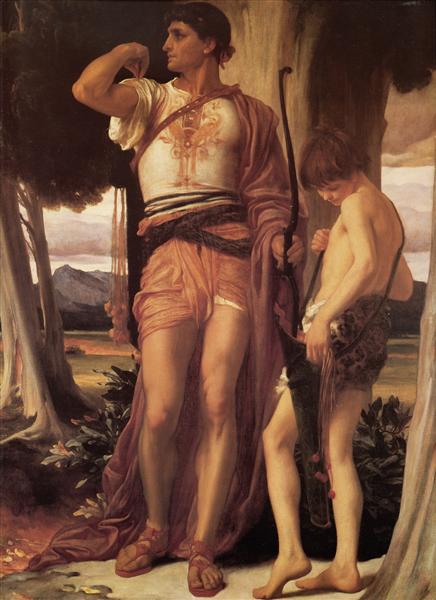Description
Frederic Leighton's Jonathan's Token to David is a masterful depiction that captures a moment of profound emotional and historical significance, rooted in the biblical tradition of the Old Testament. Created in 1868, this canvas stands not only as a testament to the artist's technical virtuosity, but also as a reflection of the thematic concerns that defined the Victorian art movement.
At the center of the composition, Leighton presents Jonathan, King Saul’s son, in a powerful and determined stance, symbolizing an act of loyalty and sacrifice towards his friend David. The character’s expression is intense and contemplative, suggesting both the sadness and nobility of his decision. The interaction between the two characters—Jonathan and the sparse background that alludes to David, although he is not physically present in the work—creates a palpable emotional tension. Jonathan’s figure, imposing and human, communicates a sense of urgency, while the shadow of duty marked on his face is intertwined with the certainty that their friendship is stronger than the ambition for power.
The use of color in this painting is remarkable. Leighton deploys a rich and vibrant palette, where warm and earthy tones stand out, evoking an almost epic atmosphere. The drapery that adorns Jonathan's body is of an exuberance that highlights the artist's skill in textural management, allowing the light to flow over the fabrics in an almost palpable way. The subtle contrast between the golds of the background and the shadows of the main figure emphasizes his prominence, guiding the viewer's gaze through the space depicted. At the same time, this compositional decision provides a sense of immediacy, making the viewer feel like a witness to the moment.
Leighton was a leading exponent of the Pre-Raphaelite movement and, although his style transcended its conventions, his love of narrative remains in works such as this one. The fusion of precise drawing with a proliferation of evocative detail, characteristic of his work, produces an almost sculptural effect in the figure of Jonathan, who seems to emerge from the canvas with a vibrant energy. Through the depiction of the human figure and the detailed study of the body, we can see the influence of classical sculpture, a common feature in Leighton's style.
It is also important to mention that "Jonathan's Sign to David" relates to other works by Leighton in which he explores themes of love, loyalty and sacrifice. These works, often inspired by mythology and classical literature, are imbued with a strong emotional charge that resonates with the viewer in a lasting way. His ability to intertwine emotional narratives with virtuoso painting technique places him among the great masters of his time and grants him a prominent place in art history.
With its display of color, form, and emotion, “Jonathan’s Sign to David” not only establishes a dialogue between history and aesthetics, but also invites the viewer to reflect on the complexities of friendship and sacrifice. The work, at its core, becomes an echo of the human condition, resonating through time and offering a glimpse into the intricate web of loyalties that make up human relationships. In Leighton’s painting, history comes alive and art becomes a powerful tool of communication, opening the doors to interpretations and reflections that transcend their time and place.
KUADROS ©, a famous painting on your wall.
Hand-made oil painting reproductions, with the quality of professional artists and the distinctive seal of KUADROS ©.
Painting reproduction service with satisfaction guarantee. If you are not completely satisfied with the replica of your painting, we will refund 100% of your money.

